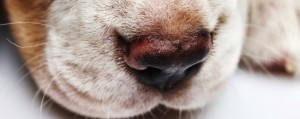 HYANNIS – Dogs, our loyal companions for at least 10,000 years, use their keen sense of smell to assist in finding missing people and detecting bombs. Now, canines are taking their incredible olfactory power – perhaps, some believe, accompanied by a preternatural “sixth sense” – into new, exciting territory: detecting cancer.
HYANNIS – Dogs, our loyal companions for at least 10,000 years, use their keen sense of smell to assist in finding missing people and detecting bombs. Now, canines are taking their incredible olfactory power – perhaps, some believe, accompanied by a preternatural “sixth sense” – into new, exciting territory: detecting cancer.
Researchers are successfully training dogs to detect cancer, and studies are underway on the training and handling of medical scent detection dogs.Daniel J. Canaday, MD, a Cape Cod Healthcare oncologist at Cape Cod Hospital and Falmouth Hospital, is buoyed by this unusual – and powerful – development in cancer detection.
“It’s wonderful to have these reports,” Dr. Canaday said. “Small controlled studies suggest that dogs seem to be able to pick out samples from cancer patients compared to healthy volunteers with remarkable accuracy.”
For instance, test dogs detected colon cancer from stool samples, he said. Dogs sniffing urine seem able to pick up on people with bladder cancer. And in breast and lung cancer patients, the indicators are from the person’s breath. In 2011, dogs in Japan detected colorectal cancer with 98 percent accuracy by sniffing stool and breath samples – a more accurate detection than traditional tests.
The “seminal report” as Dr. Canaday calls it, occurred more than 25 years ago, when a doctor at King’s College London wrote about a patient whose dog, a border collie-Doberman mix, continually sniffed a mole on her owner’s thigh. After the dog tried to bite off the mole, the owner visited her doctor, who diagnosed malignant melanoma. “The dog may have saved her owner’s life,” Williams reported in the British medical journal The Lancet in 1989.
“We don’t know what they’re detecting,” Dr. Canaday said. He and his colleagues presume that the dogs are smelling volatile organic compounds (VOCs) emitted by tumor cells. Dogs’ sense of smell is 100,000 times greater than humans.

“People are very interested in what they are smelling,” Dr. Canaday said. “We just don’t know what that ‘something’ is. The research with dogs could eventually lead to an electronic ‘nose’ for cancer detection if we can identify the compounds the dogs are picking up and duplicate that detection in the lab.”
Dr. Canaday is certified in Radiation Oncology by the American Board of Radiology and received his medical degree at the University of Chicago’s Pritzker School of Medicine. He said the research with dogs speaks to a larger issue of improved screening of all kinds, which is responsible for improvements in cancer cure rates in recent years.
“We have screening tools based on clinical exams, X-ray testing and tumor markers in the blood, but this might open an entirely new method for general screening if the technology could be made available,” he said.
Major institutions are embracing the possibilities of using dogs for cancer detection. Dina Zaphiris, a dog trainer and the founder of the In Situ Foundation in Chico, California, is working with researchers at Duke University and the University of California, Davis, to train dogs to detect breast cancer.
“There remains a great need for a low-cost, non-invasive, low-risk, and highly accurate screening method for early-stage cancer, both in sensitivity and specificity,” Zaphiris said in an email.
“These are major research institutions that have the technology and wherewithal to move these studies forward,” said Dr. Canaday. And the developments are highly encouraging.
“It’s wonderful to have these reports,” he says. “Obviously, there is something there.”
By MARY GRAUERHOLZ, OneCape Health News

























Speak Your Mind